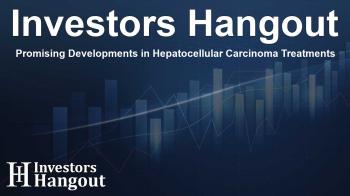Promising Developments in Hepatocellular Carcinoma Treatments

SCG Presents Breakthrough Data on SCG101 in Liver Cancer Therapy
Today, SCG Cell Therapy Pte Ltd, a pioneering biotechnology firm specializing in TCR T cell therapy for infectious diseases and cancers, unveiled its latest findings from a Phase 1 trial featuring SCG101, an innovative HBV-specific TCR-T cell therapy targeted at advanced HBV-related hepatocellular carcinoma (HCC). These developments were showcased at a prominent medical congress.
Key Efficacy Results from the SCG101 Trial
The trial's outcomes revealed that SCG101 achieved significant clearance of serum hepatitis B surface antigen (HBsAg) and HBV-DNA levels in patients with advanced HBV-related HCC who had previously undergone extensive treatment. Impressively, 94% of the participants had been treated with nucleoside analogue (NA) antiviral therapies, and 72% were noted to have liver cirrhosis at the start. Following a single infusion of SCG101, patients experienced rapid and substantial declines in serum HBsAg levels, with 94% of individuals achieving reductions ranging from 1.0 to 4.6 log?? in just 28 days and maintaining levels below 100 IU/mL for periods extending up to one year. Remarkably, 23.5% of patients reported complete HBsAg loss.
Antitumor Activity and Patient Outcomes
Beyond its antiviral potential, SCG101 made strides in demonstrating antitumor efficacy. Each participant had previously undergone at least two lines of systemic cancer therapies, including immune checkpoint inhibitors. Despite the challenges posed by this heavily pre-treated cohort, 47% of patients (8 out of 17) showed measurable tumor regression. As of the latest review, the median overall survival (OS) has not yet been finalized.
Safety Profile of SCG101
Overall, SCG101 was generally well tolerated among trial subjects, maintaining a favorable safety profile. Transient elevation in alanine aminotransferase (ALT) levels was reported in 94% of patients, a response consistent with the cytolytic action of the therapy, and these elevations resolved within two weeks. Common treatment-related adverse events (TRAEs) included cytokine release syndrome (CRS), neutropenia, and thrombocytopenia, all of which were manageable and reversible.
Expert Insights on SCG101's Potential
Prof. Dr. Shunda Du, Chief of Liver Surgery Department from a leading academic hospital, commented on the dual antiviral and antitumor effects of SCG101, expressing optimism about its potential as an innovative immunotherapeutic option for patients suffering from HBV-related HCC. He emphasized that the sustained clearance of HBsAg coupled with observable tumor responses signifies a promising advancement in addressing a significant clinical demand.
Understanding Hepatitis B and Its Impact
Globally, Hepatitis B (HBV) poses a substantial health challenge, impacting over 250 million individuals. This virus is a leading contributory factor for liver cancer, accounting for between 50% and 80% of HCC cases worldwide. Chronic HBV infections can lead to the incorporation of HBV DNA into the host's genome, maintaining HBsAg expression, promoting chromosomal instability, and triggering oncogene activation, all of which heighten the risk of developing HCC.
Mechanism of Action for SCG101
SCG101 is tailored to specifically target and eliminate HBV-infected hepatocytes and HCC cells through the recognition of specific epitopes of the HBV surface antigen (HBsAg) displayed by the major histocompatibility complex (MHC). By utilizing both cytolytic and non-cytolytic mechanisms, SCG101 effectively clears HBV-infected hepatocytes along with premalignant and HBV-HCC cells that exhibit HBV-DNA integration.
Future Directions for SCG101
Christy Ma, Chief Executive Officer of SCG Cell Therapy, remarked on the significance of these findings in the ongoing development of SCG101 and highlighted the need for precision T cell therapies aimed at chronic HBV infections and their related liver cancers. SCG101 stands out as the inaugural TCR-T cell therapy to show both virologic clearance and tumor regression among patients with HBV-related HCC, fueling expectations for its advancement into further clinical stages to offer a transformative solution for those affected.
Frequently Asked Questions
What is SCG101?
SCG101 is a TCR-T cell therapy designed to target HBV-infected cells and effectively contribute to tumor regression in patients with related cancers.
What was the trial's key finding?
The trial revealed that SCG101 achieved significant HBsAg clearance and tumor regression in a patient population heavily pre-treated for liver cancer.
How well was SCG101 tolerated by patients?
The treatment exhibited a favorable safety profile, with manageable side effects that resolved promptly after treatment.
What are the implications of these findings?
The results point towards SCG101 as a potential breakthrough therapy for patients who have limited options due to advanced HBV-related cancers.
How does SCG101 work?
SCG101 targets specific epitopes of HBsAg to eliminate HBV-infected cells through immune-mediated mechanisms, addressing serious viral infections and cancer.
About The Author
Contact Addison Perry privately here. Or send an email with ATTN: Addison Perry as the subject to contact@investorshangout.com.
About Investors Hangout
Investors Hangout is a leading online stock forum for financial discussion and learning, offering a wide range of free tools and resources. It draws in traders of all levels, who exchange market knowledge, investigate trading tactics, and keep an eye on industry developments in real time. Featuring financial articles, stock message boards, quotes, charts, company profiles, and live news updates. Through cooperative learning and a wealth of informational resources, it helps users from novices creating their first portfolios to experts honing their techniques. Join Investors Hangout today: https://investorshangout.com/
The content of this article is based on factual, publicly available information and does not represent legal, financial, or investment advice. Investors Hangout does not offer financial advice, and the author is not a licensed financial advisor. Consult a qualified advisor before making any financial or investment decisions based on this article. This article should not be considered advice to purchase, sell, or hold any securities or other investments. If any of the material provided here is inaccurate, please contact us for corrections.

